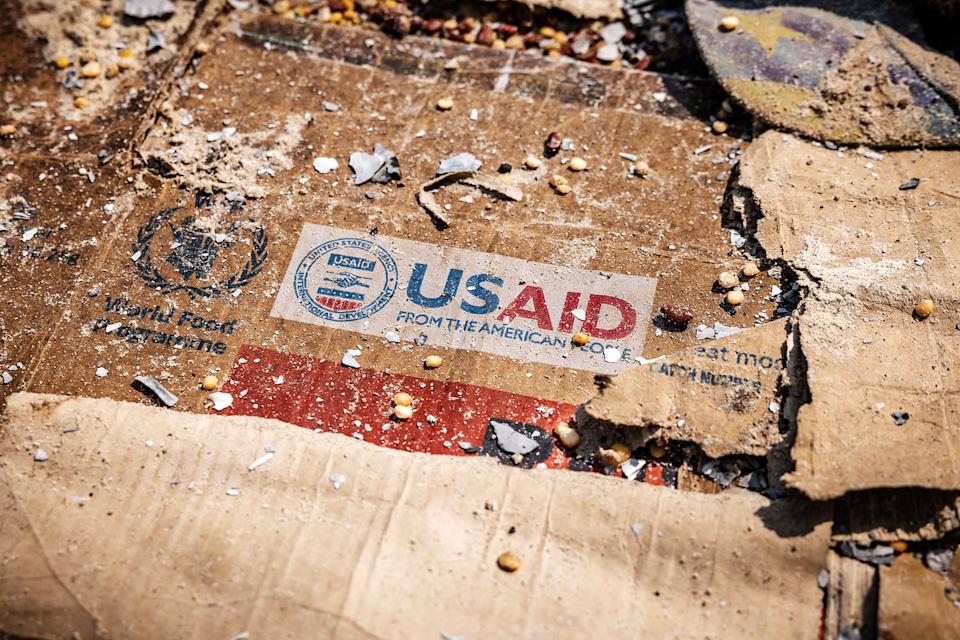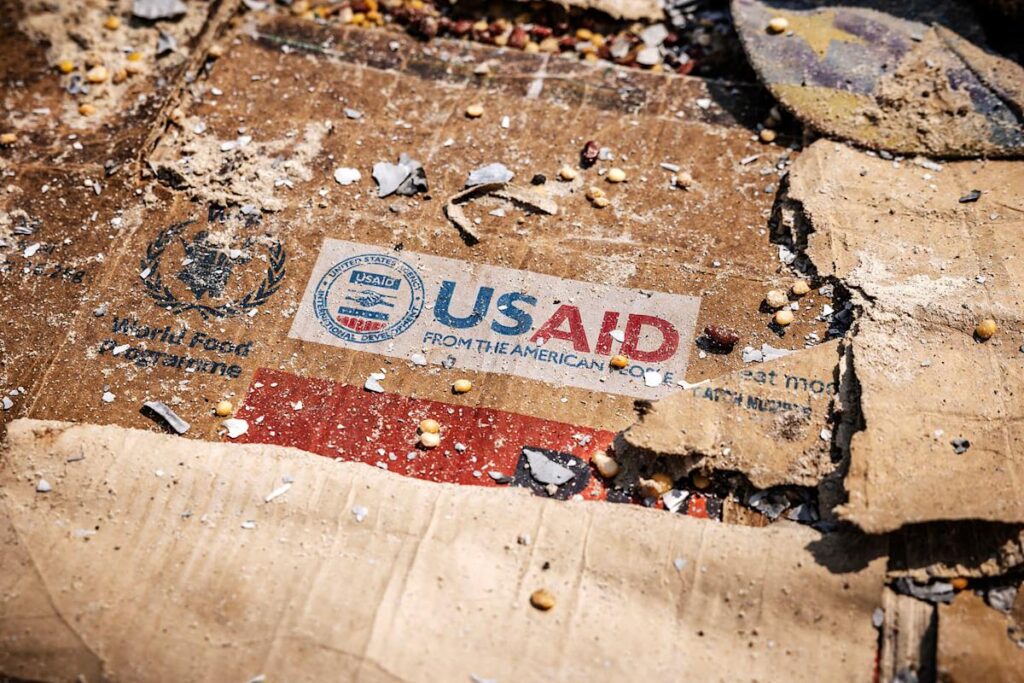Millions of people around the world are today feeling the repercussions of President Donald Trump’s decision to freeze international aid for 90 days and shut down the U.S. Agency for International Development, by far the largest provider of foreign assistance around the world.
From biosecurity and vaccines for viruses such as polio, mpox and Ebola, to food supplies for famine-stricken countries and essential treatment for people living with HIV, a vast number of programs around the world have been hit by the decision, current and former USAID workers told NBC News.
“Probably we have lost lives,” Marcia Wong, who served as deputy assistant administrator of USAID’s Bureau for Humanitarian Assistance under the Biden administration, said in an interview earlier this month.
Everybody interviewed for this article spoke to NBC News before the Trump administration said Sunday that it was eliminating 2,000 positions at USAID, and placing all but a fraction of other staffers on leave.
Here, NBC News looks at the broad impact the pause on foreign aid has had and what is at stake.
Life-threatening cuts
According to the government website ForeignAssistance.gov, the U.S. disbursed around $72 billion in foreign aid in the year ending Sept. 20, 2023 — the latest year with up-to-date data. USAID, which for decades has served as the country’s primary foreign aid agency, managed around $44 billion in global assistance that fiscal year, disbursing that money to aid programs and operations in 160 countries and regions around the world.
After Trump signed an executive order Jan. 20 freezing foreign assistance, American-funded aid and development programs worldwide were forced to scale back, shut down and lay off staff.
USAID supporters rally on the grounds of the Capitol in Washington on Wednesday.
While Secretary of State Marco Rubio said he had sought to mitigate the damage by issuing a waiver to exempt emergency food aid and “lifesaving” programs, a current USAID official based in Latin America described the process as “like a big sham.”
“Nothing is happening,” the official, who spoke on condition of anonymity because they feared losing their job and hurting their career prospects, told NBC News.
“We have supposedly gotten some waivers for some HIV programming, but our accounts are still frozen,” they added.
A report released on Feb. 10 by USAID’s Office of the Inspector General also warned about the uncertainty surrounding the waivers for lifesaving assistance, which it said put “more than $489 million of food assistance at ports, in transit, and in warehouses at risk of spoilage, unanticipated storage needs, and diversion.”
USAID Inspector General Paul Martin was fired the day after his office released the report, which warned of the negative impacts the administration’s dramatic downsizing of the agency would have.
Prevention and mitigation
One of the biggest and arguably most successful USAID programs is the President’s Emergency Plan for AIDS Relief, or PEPFAR, which works in more than 50 countries. It is credited with saving more than 25 million lives since it was launched in 2003.
The Trump administration’s actions essentially brought the program to a halt, although it also said it would issue waivers for lifesaving treatment.
Meanwhile, on Thursday, U.S. District Judge Amir H. Ali said the Trump administration had continued to withhold foreign aid despite a court order he issued Feb. 13 demanding the funding freeze be temporarily lifted. Still, Ali declined a request from nonprofit groups to find the Trump administration in contempt of the order.

A USAID logo on a box at a warehouse following looting in Bukavu, in the Democratic Republic of Congo.
Millions of HIV-positive people who access antiretroviral treatment “get those drugs through PEPFAR,” according to a former officials at USAID’s global health bureau.
Now, “those efforts are not happening,” added the official, who like most others interviewed for this story spoke on condition of anonymity for fear of losing their job and hurting their career prospects.
Global health
As well as threatening health programs abroad, dismantling the agency would impact health at home too, several current and former USAID workers warned.
“The administration’s dismantling of the agency has completely invited the next pandemic to unravel and to come to the United States,” the former official from the global health bureau said, citing the outbreaks of mpox and Ebola in parts of Africa.
A separate USAID worker who spoke on the condition of anonymity for fear of losing their job also cautioned that America’s ability to contain outbreaks from becoming epidemics or even pandemics had been hurt.
“Everything from biosecurity to safety in labs to preparedness and prevention of outbreaks” was being seriously impacted, along with the ability to contain them “before they become global events,” the person said.
“We can’t wait until cases are coming into the country and we’re screening at the airport for us to be secure as a country,” the USAID worker said. “This is going to have serious impacts, not just on our programming overseas, but on our own security and safety in America.”
Agriculture and environment
As well as funding health programs, USAID supports farmers and agricultural programs. In fiscal year 2023, more than $1 billion in disbursements managed by USAID covered agricultural initiatives, according to ForeignAssistance.gov.
More than $11 million went to aid and development programs covering environmental initiatives, with the majority of that funding focused on sub-Saharan Africa.
USAID has also helped in conservation efforts around the world, including the Brazilian Amazon, where it supported grassroots organizations aimed at improving family farming and addressing climate change.
Peace and security
More than $16 billion in disbursements managed by USAID was dedicated to “government and civil society” initiatives in fiscal year 2023, according to ForeignAssistance.gov, which also found $1.58 billion dedicated to democracy, human rights and governance. Some $416 million went to “peace and security.”
USAID has provided “significant humanitarian, development and economic support” to Ukraine, which has been engaged in a full-scale war with Russia for almost three years, according to a review by the Congressional Research Service updated Jan. 6.
An aid worker distributes measured portions of yellow lentils supplied by USAID in Mekele, Ethiopia.
The review found Ukraine was one of 130 countries helped by the agency, with the other recipients in the top 10 including Ethiopia, Jordan, the Democratic Republic of Congo, Somalia, Yemen, Afghanistan, Nigeria, South Sudan and Syria.
Humanitarian assistance has also been provided to Palestinians in the Gaza Strip during more than 15 months of war between Israel and Hamas. In a November news release, the agency said it had invested more than $600 million in economic support funding for Palestinians since 2021. This was in addition to more than $1.2 billion dedicated to humanitarian assistance for Palestinians since Oct. 7, 2023.
The U.S. is also Israel’s biggest arms supplier, spending at least $17.9 billion on military aid during the first year of the war in Gaza, according to a November report for Brown University’s Costs of War project.
The freeze on aid funding prompted some analysts to warn that the U.S. risks losing its standing on the global stage if it withdraws from foreign development, which would open a space for rival powers such as China and Russia.
This article was originally published on NBCNews.com
Read the full article here


